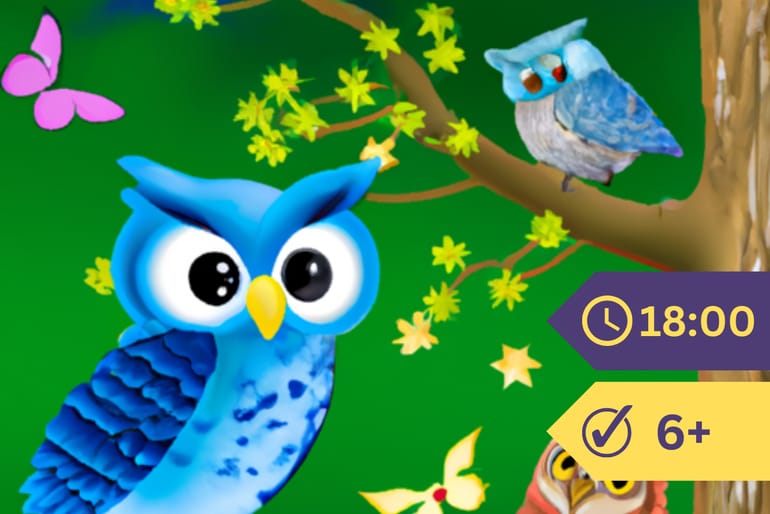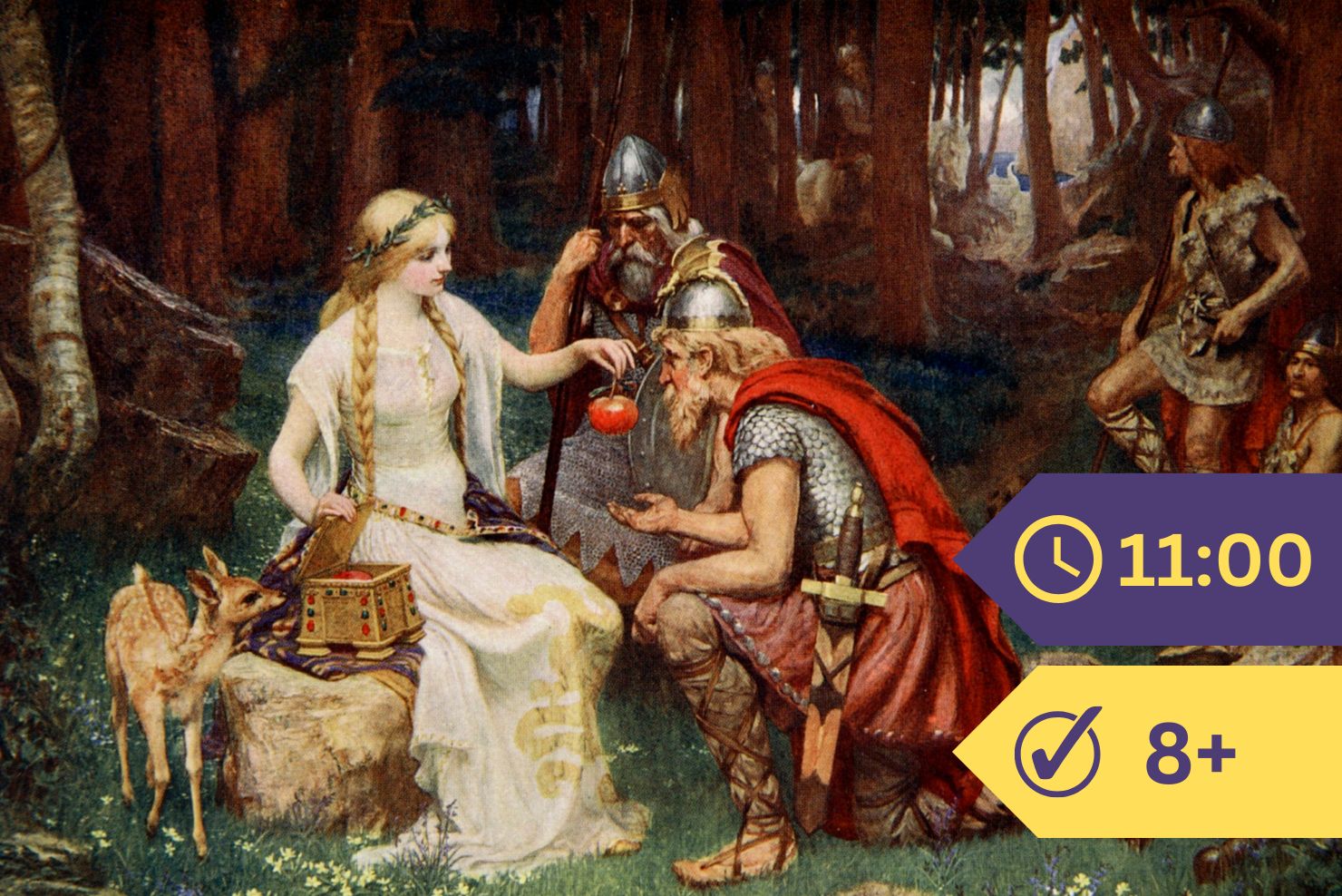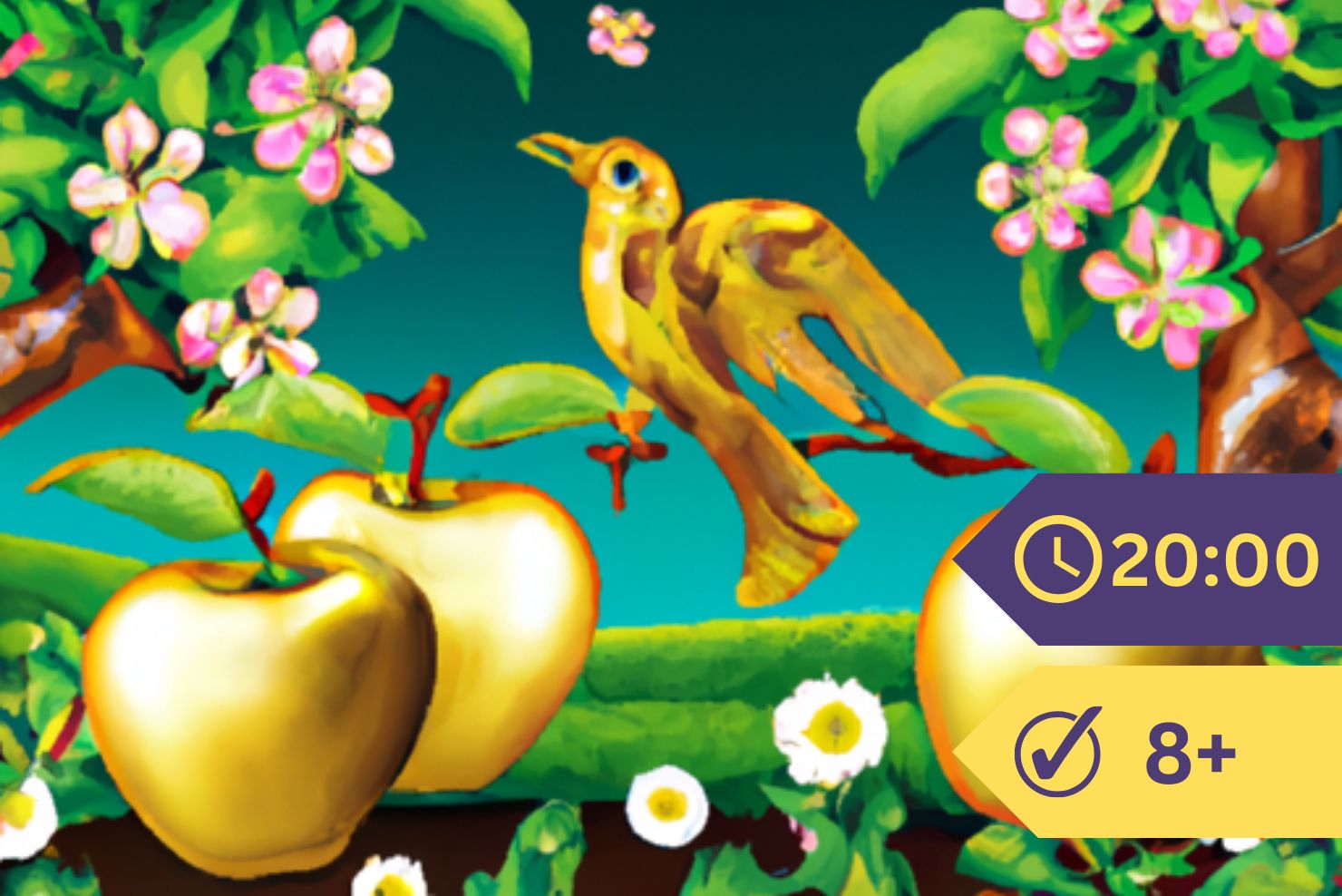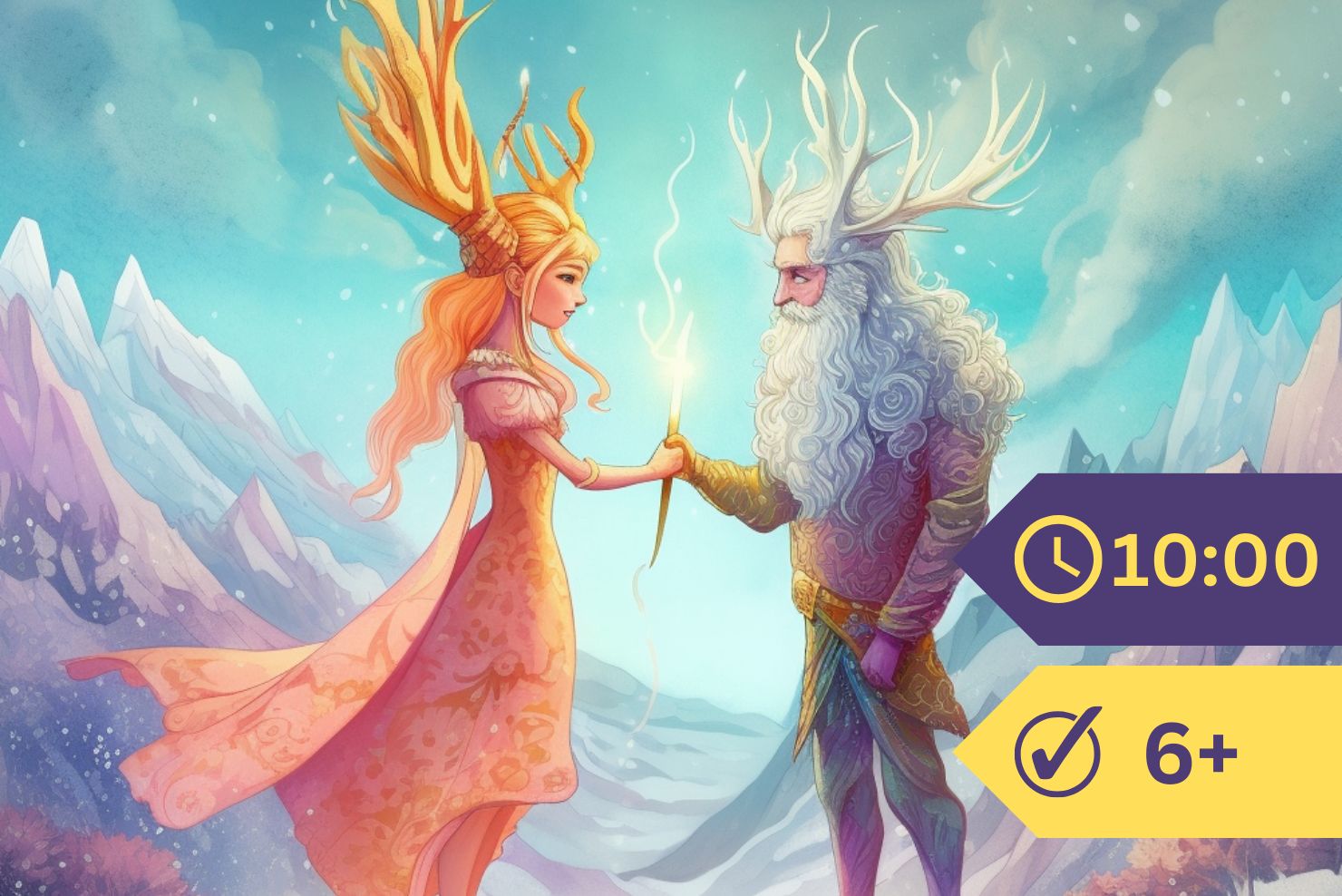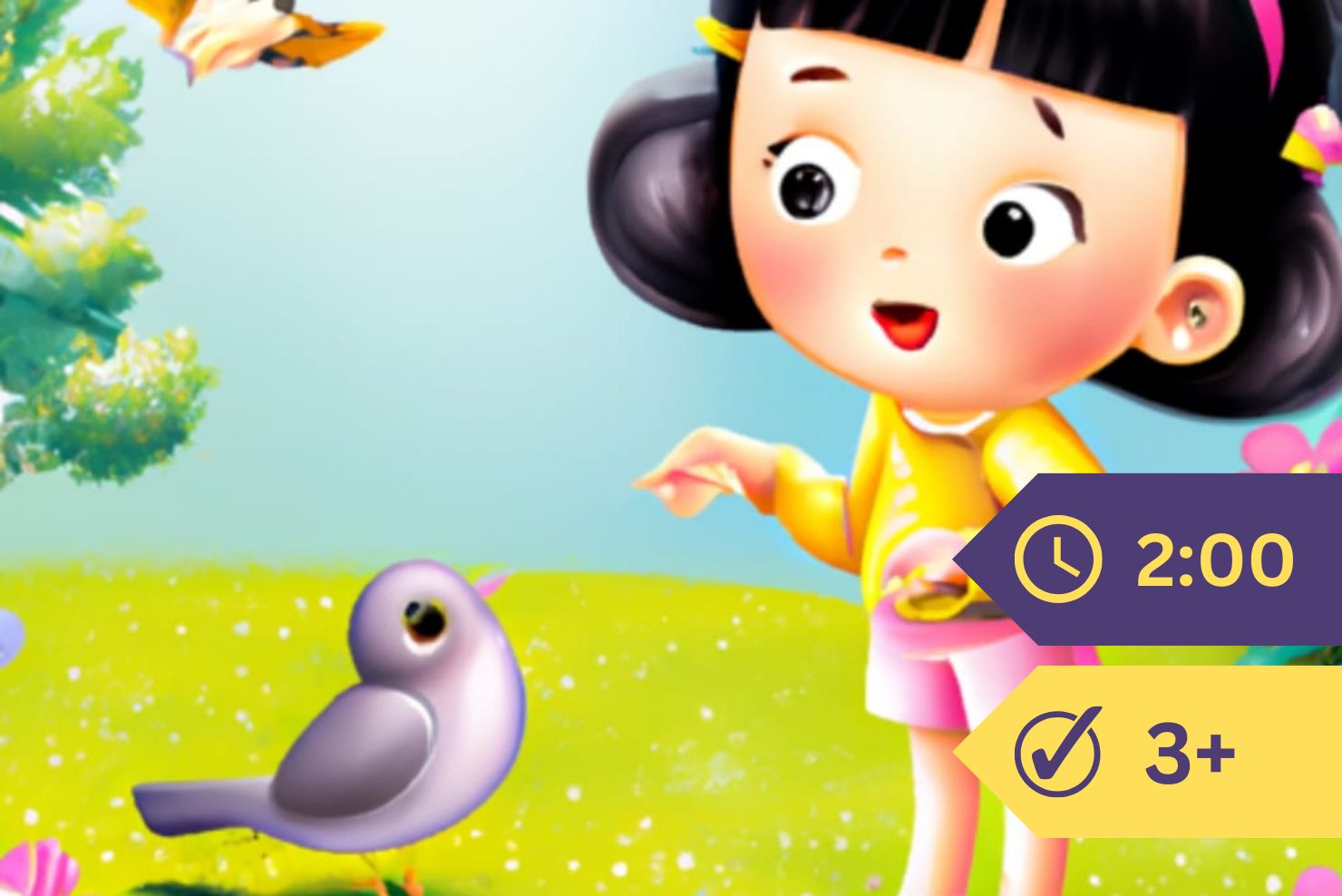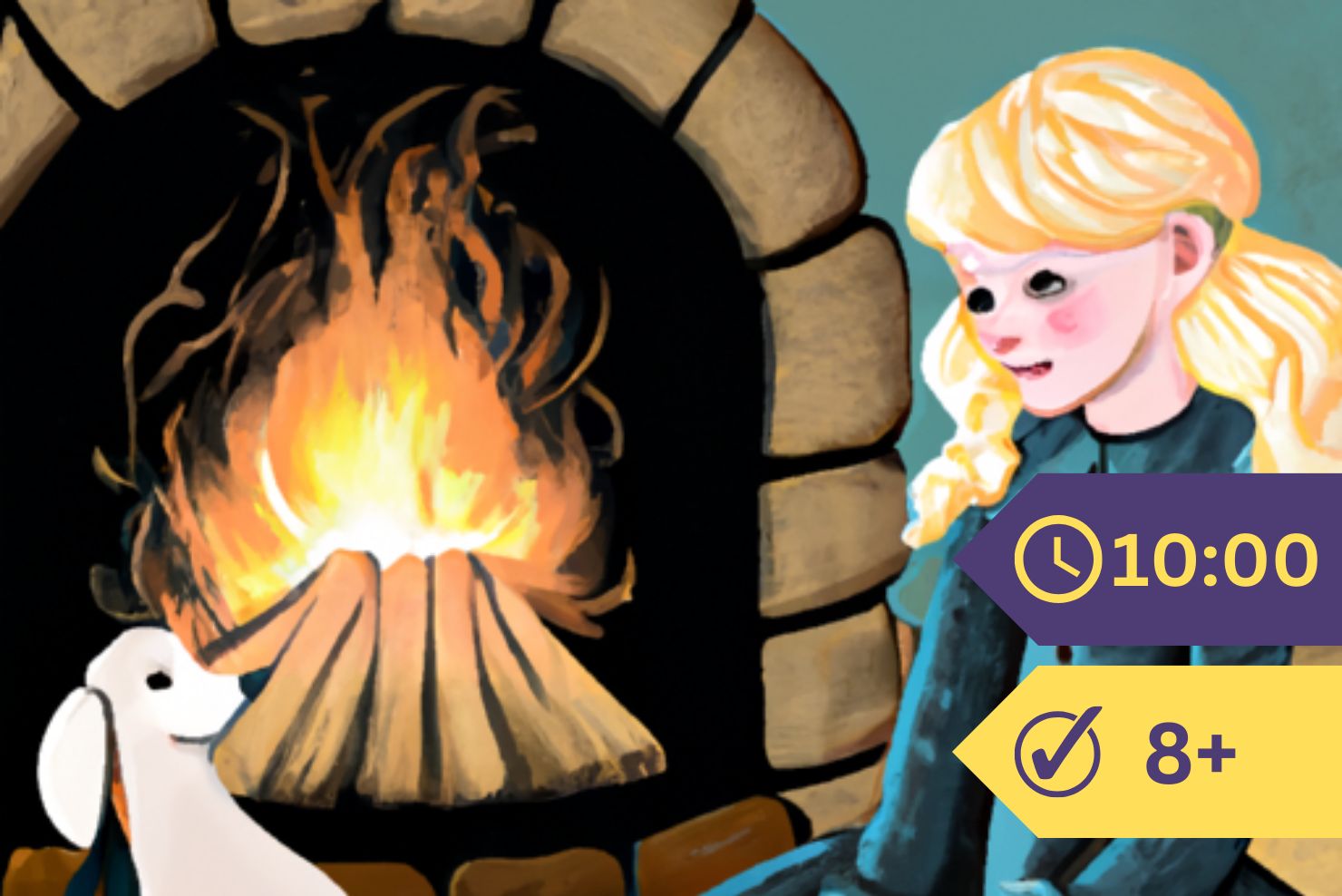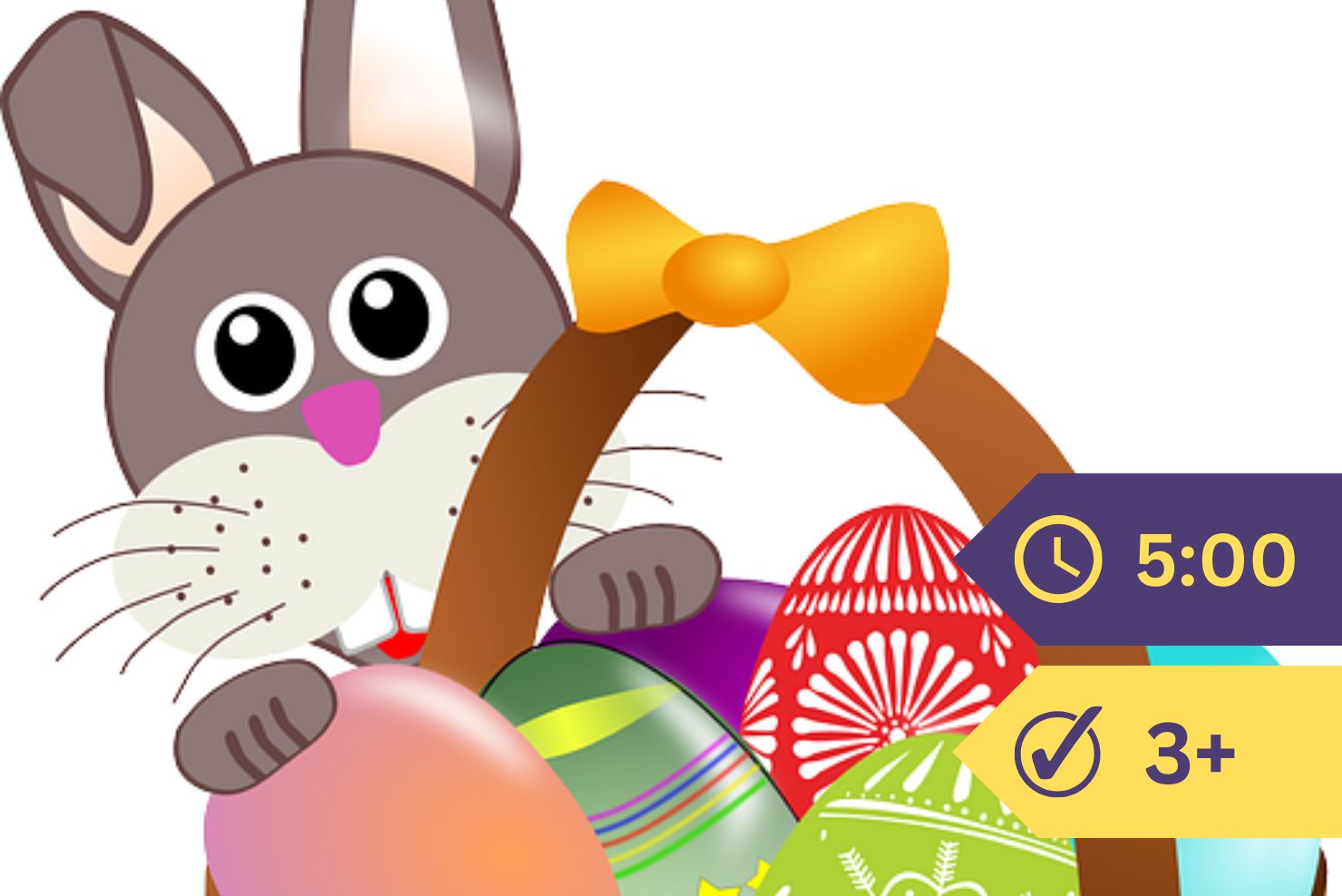Arthur was a boy who loved the woods and asked many questions. The Wise-and-Wonder-Man was the spirit of the woods whom Arthur met one day and who answered all his questions. It happened one day just as the snow was disappearing and the sun was growing warm. Arthur had been taking his first spring walk, and, as he was a bit tired, he sat down on the sunny slope of a hill. Out of the leaves of the tree in front of him slid the Wise-and-Wonder-Man, dressed in his light blue suit with every button a silver bell. At every move he made, the bells went tinkle-tankle, tinkle-tankle. Arthur was so surprised that he almost forgot to breathe.
“Good morning, Arthur,” said the Wise-and-Wonder-Man, “what are you wondering about now?”
“I was just wondering,” said Arthur, nodding his head toward a bluebird, “why the bluebird is the first bird of spring.”
“Why, he is the herald, you know.”
“But how did he come to be the herald? Do you know?”
“I have heard,” said the Wise-and-Wonder-Man.
“Who told you?”
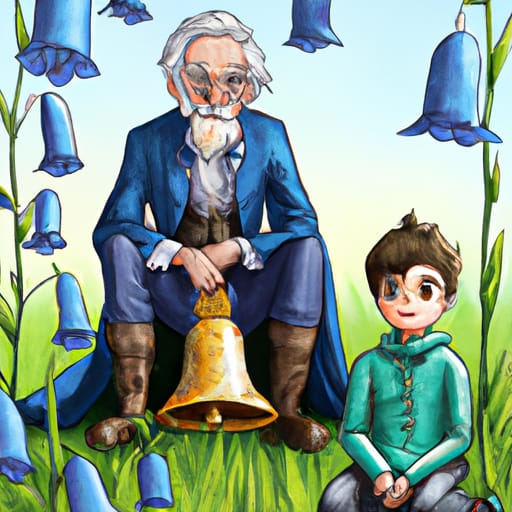
“My grandmother. She said her grandmother’s grandmother’s grandmother told the story; and what her grandmother’s grandmother’s grandmother said, my grandmother says is so.”
“Of course,” said Arthur. “Would you tell me the story?”
“Certainly; make yourself comfortable.”
Arthur lay down on one elbow and the Wise-and-Wonder-Man sat down on the grass and talked.
“You know there are four spirits of the year, Springtime, Summer, Autumn, and Winter. Some folks call them seasons, but they are really spirits. Of all four spirits, Springtime is the favourite. He had been coming to the earth every year for a great many years, year after year, when he got it into his head that it would be a fine thing and quite becoming to his dignity to have a herald,—some one to carry his colours and play the fife. At first he thought of the fragrant flowers, they could bear his colours. But he reflected that they could not play the fife. Then he thought of the buzzing bee; he might be taught to play the fife. But he remembered that he would not do, because he could not carry the colours. So he decided that he must have a bird.
Springtime, being a very lively and practical spirit, called the birds together that very morning. He asked them all to meet him by the Great Rock under the Great Tree by the Great Bend of the Big River. They all came—birds of every size and colour and description. He sat on the Great Rock while the birds sat on the grass and listened with wide, round, blinking eyes and with heads cocked to one side.
He told them that he desired a herald to carry his colours and to play the fife. Of course, the bird to be chosen should be handsome and musical. But he must be more than all that. He wanted a bird of exceptionally good character, in fact, the very best bird that could be found. He did not expect to find a perfect bird, he said, but he desired a bird as nearly perfect as he could obtain. He concluded his speech by saying that his herald should be: ‘Both handsome and happy, gifted and good, And as modest as modest can be. The very best bird that flies in the wood, I would that my herald be he.
The choice, he said, he would leave to the birds as they knew each other thoroughly.
The birds put their heads together and talked in at least forty different languages. Finally, their spokesman told Springtime that they were content to leave the selection to a committee of six. As Springtime wanted to be on good terms with all the birds, he thought it would be best that he didn’t appoint the committee. He pulled a handful of grass and held it tightly between his hands just so that the ends would stick out, and then he asked the birds to come up, one by one, and pull out a blade. The six who should draw out the shortest blades of grass were to be the committee.
They walked up one by one, and drew. Mr. Crow drew the shortest blade and so was the chairman. Mr. Parrot came next, then Mr. Blue Jay, Mr. Robin, Mr. English Sparrow, and Mr. Bluebird. It was a strange committee, to be sure, of all sizes and kinds of birds.
That very evening the six birds met in a corner of Mr. Farmer’s orchard upon a dead branch of an old apple tree. They talked and talked and talked. They discussed all the birds that they knew, spoke of their good qualities and their bad ones.
At last, as it grew late, very late, almost eight o’clock, and they had come to no conclusion, Mr. Bluebird proposed that they should vote, and all agreed. But how should they vote? That was the next question. Mr. Bluebird suggested that each one, as his name was called, should stand up and say which bird he thought was best fitted to be the herald. Mr. Crow cleared his throat and said that he did not think this was the wisest way. He thought it better, he continued, that each one should write the name of his choice on the under side of a leaf. The other members of the committee agreed with Mr. Crow. Each bird, therefore, took a leaf, and wrote a name on it, and Mr. Bluebird counted the votes. There was one vote for Mr. Crow, one vote for Mr. Parrot, one for Mr. Blue Jay, one for Mr. Robin, one for Mr. English Sparrow, and one for—I don’t remember whether it was for Mr. Song Sparrow or Mr. Bobolink. Would you believe it?—every bird except the bluebird had voted for himself. The bluebird knew, because he knew the foot-writing of all the birds. He had seen it in the soft sand by the water.
It was certain that they were not going to be able to decide among themselves who should be chosen, so Mr. Bluebird made another suggestion.
“‘I recommend,’ he said, ‘that we go and consult the old Wizard, Mr. Owl, who holds court every night by the light of the moon in the hollow of a great grey tree over the ridge. He is the wisest of birds and knows everything. I have heard, too, that whenever there is a star with a tail in the sky he can read your fortunes and your character. Now it so happens that at this very time there is in the sky a star with a tail, for I saw it this morning. Little Bluey, my eldest child, woke up very early and I had to fly out to get him a worm to keep him quiet. Just as I was starting, long before sunrise, I saw the comet. I propose that we go at once and consult the Wizard and let him decide for us who should be the herald.’
“‘It seems to me,’ said the crow, ‘that this is an excellent suggestion. The Wizard is certainly a very wise bird. I have heard of him and doubtless he has heard of me. Let’s go.’
It was decided then and there that they should go that very night, just as soon as the comet rose. Mr. Bluebird was to give the signal because he knew where to look for the comet.
At the right moment Mr. Bluebird shook them all by the wing and woke them up, and they started, Mr. Crow going first, then Mr. Parrot, Mr. Blue Jay, Mr. Robin, Mr. English Sparrow, and Mr. Bluebird.
They flew and they flew and they flew, for it was a long way and a hard way to find, and not one of the six had ever been out so late in his life. When they reached the wood they had to fly very carefully, so that they wouldn’t bump their heads against the trees, and so that they might be able to read the signs along the way. At last they saw a great grey tree, with a dimly lighted window in it, far up the trunk. Mr. Crow read the name on the door-plate and announced that they had reached the right house. There was no door-bell so Mr. Crow scratched three times,—scratch, scratch, scratch.
“‘Who-who?’ came from within.
“‘Friends,’ said the crow, ‘six friends come to consult the Wizard.’
The door opened and the six birds walked in and up the stairs.
They found themselves in a little dark round room with seats against the sides. Mr. Owl sat over on one side. He had his spectacles on and was reading by the light of his lamp,—that is, it looked like a lamp, but Mr. Owl explained later that it was not a lamp but the comet’s light which he caught.
The Wizard received them pleasantly and motioned to them to be seated. Mr. Crow sat down in front of the Wizard at his right, then the others in order, Mr. Bluebird sitting at the left.
“‘It is very late,’ observed the owl. ‘It must be most important business that brings you to me at this hour of the night.’
“‘It is,’ replied the crow.
Then he told the Wizard what their problem was. He repeated the speech of Springtime, especially the last words: “‘Both handsome and happy, gifted and good, And as modest as modest can be. The very best bird that flies in the wood, I would that my herald be he.’
He told the Wizard of their inability to decide who should be chosen and of their conclusion to leave the choice to him. This was the reason of their visit.
Then the owl looked grave as a judge and remarked, ‘It seems to me in this situation that the first thing to be done is to secure the opinion of each of you as to who is the fittest bird to be chosen. Mr. Crow, will you be so good as to give us your opinion?’
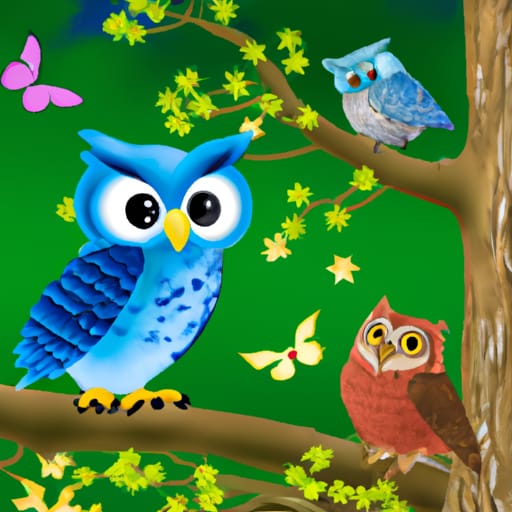
Mr. Crow stood up, cleared his throat, and said, ‘To speak quite frankly, it seems to me that I, myself, should be chosen. It is scarcely possible to find a better bird.’
‘What makes you think so?’ asked the owl.
‘My wife,’ said the crow. ‘Mrs. Crow said to me, “Mr. Crow, my dear husband, you are a perfect man.’
‘Mr. Parrot,’ said the Wizard, ‘your opinion, if you please.’
‘It is my opinion,’ said Mr. Parrot, ‘that I am the bird who should be chosen. I have heard myself talk on many occasions, and I am sure that I speak both wisdom and wit.’
‘Mr. Blue Jay!’ called the Wizard.
‘Since you ask me, Mr. Wizard, for my honest opinion I am bound to say that I feel that I am the only bird for this position. I have been looking in the mirror today; in fact, I see myself in the mirror very often, and I have never seen a single fault in myself.’
‘Mr. Robin, if you please.’
Mr. Robin arose and said: ‘I am quite convinced, Mr. Wizard, from much observation, that I should be made the herald. I am handsome and gifted, if I do say it myself. Besides, I live in the best of society; I dwell in the Bishop’s orchard. This very day I heard the Bishop say, “That robin is a fine, handsome bird,—as fine and handsome as a Bishop.” I am sure that recommendation is enough.’
‘Mr. English Sparrow.’
‘I am sure, Mr. Wizard,’ said the sparrow, speaking very rapidly and excitedly, ‘that while I am not so big as some of these who have spoken, I have a better claim than any of them to this high office. For I have long made it a practice to study carefully the faults and weaknesses of all the other birds, and I know that I have none of these failings.’
‘Mr. Bluebird,’ said the Wizard, ‘what have you to say?’
‘Nothing, Mr. Wizard. I have not made up my mind. I leave the matter entirely to your eminent wisdom and judgment.’ And he sat down.
‘Well,’ said the owl, after a moment, ‘the next thing to do under these circumstances seems to be to read your fortunes, that is, your characters, in the light of the comet. I shall ask you, one by one, to step up on this judgment-seat at my left, where the light of the comet can fall on you and where I can see you clearly. Mr. Crow, will you be the first?’
Mr. Crow stepped up to the judgment-seat very confidently, while the Wizard put on his spectacles and turned the lamp so that the light fell full upon the glossy feathers of the large black bird. It was a revolving seat, which the Wizard turned round and round slowly so that he could see all sides of the bird. ‘A fine bird,’ he said, very deliberately, as if thinking aloud, ‘a perfect bird, unless—unless what?—let me see—ah, a slant in the left eye—in both eyes—a very decided slant—very sly—very cunning—inclined to steal—very much inclined to steal—a thief, in fact; steals Mr. Farmer’s corn and peas—especially in the early morning when nobody is around—a very bad fault—one of the worst. I am quite sure, Mr. Crow, that Springtime would not choose you for his herald—he could not trust you. That will do. Mr. Parrot!’
Mr. Parrot walked up and took his place on the judgment-seat. The Wizard gazed at him gravely and stroked his back. ‘Fine feathers—green, red—yellow—fine feathers—rather small head—large tongue—large tongue, small head—talks more than he thinks—talks very much more than he thinks—talks often without thinking—says what he hears others say. Tongue rather harsh, too—and blisters at the end—bad words! bad words! I am sorry to say, Mr. Parrot, that I cannot recommend you as herald. People would not be glad to see you year after year. That will do. Mr. Blue Jay!’
The blue jay stepped up and took the seat.
The Wizard looked at him admiringly, for he was dressed in a beautiful tailor-made suit that fitted him to perfection. ‘A handsome bird,’ he said, ‘a handsome bird,—that is, handsome clothes. Eye very good, too—a little slant, a little slant—but on the whole a good eye. Let me see, what is this on the back of the head? these long feathers?—oh, a crest! I see. Just for decoration. A vain bird, vain as a peacock—and like all vain people, hard to get along with—and very unfriendly—likes to flock alone—other folks not quite good enough. I regret to inform you, Mr. Blue Jay, that Springtime would not desire you as his herald. That will do. Mr. Robin!’
The robin hopped up on the seat in his fine dress suit and red shirt-front, his chest inflated and his eyes shining. The Wizard looked at him intently for some time, then he began, ‘You are the Bishop’s friend, you say. Let me see—a bright red spot on your bill—the Bishop’s cherries, I should say—but we’ll let that pass. Eye very suspicious—very suspicious—always looking even among your best friends, to see if somebody isn’t going to harm you—cannot pull a worm out of the Bishop’s garden without looking around suspiciously all the time. A very unhappy frame of mind to be in—unhappy for you—unhappy for others. You would hardly do for the herald. That will do. Mr. English Sparrow!’
The English sparrow fluttered up noisily and took his place. ‘You say,’ began the Wizard, ‘that you have not the faults of the other birds.’
‘Yes,’ said the sparrow, talking very fast, ‘I am not as mean as the crow, and I don’t talk such nonsense as old Parrot, and I’m not so stuck up as the jay, and I am not suspicious as the Bishop’s friend is. I haven’t any of the faults of the other birds.’
The Wizard pushed his spectacles up on his brow, turned the light away, and looked at him, ‘I see,’ he said, ‘I do not need the comet light at all. I could see you in the dark. Sharp bill—sharp tongue—sharp claws, in a continual state of bad temper—very quarrelsome—very unpleasant neighbour; in fact, a common nuisance. That will do, Mr. Bluebird!’
‘I am sure, Mr. Owl,’ said the bluebird, rising, ‘I am not the bird to be chosen, for I know that I am far from being a perfect bird. I have many faults. There are many nobler birds than I from whom Springtime may choose his herald.’
But the Wizard was quite insistent that the bluebird should come forward where he could read his fortune.
‘You say that you have many faults,’ remarked the Owl. ‘That may be, but I see by the light of the comet that they are small, very faint indeed. Besides, the ability to see one’s faults and the desire to correct them is the greatest of virtues. There may be better birds, but I am frank to say that I am not acquainted with them. I have no hesitation, Mr. Bluebird, in saying that it is my judgment that you should be the herald of the Spring, for, if you will permit me to say it, it seems that you are ‘Both handsome and happy, gifted and good, And as modest as modest can be.’
Mr. Bluebird blushed, while in his heart he was very happy.
Springtime agreed with Mr. Owl, and posted notices on every tree by the water’s edge that Mr. Bluebird should henceforth be his herald, the first bird of the spring.
“There is one now on the branch of that old tree,” said the Wise-and-Wonder-Man. “He is carrying the colours and playing the fife.”
“What is he saying?” asked Arthur.
“Well,” said the Wise-and-Wonder-Man, “I asked him one day and he said it was, ‘Spring-is-here, spring-is-here.’

